- Home
- Jack Canfield
A 3rd Serving of Chicken Soup for the Soul Page 3
A 3rd Serving of Chicken Soup for the Soul Read online
Page 3
Finally, we would love to hear about your reactions to
Page xx
this book. Please write to us and tell us how these stories affect you. Also, we invite you to become part of this wonderful "network of upliftment" by sending us your stories.
Stories are like fairy gold. The more you give away the more you have.
Polly McGuire
Please send us any stories, poems and cartoons you think we should include in future volumes of Chicken Soup for the Soul. See page 333 for our address. We look forward to hearing from you. Until then . . . may you enjoy reading A 3rd Serving of Chicken Soup for the Soul as much as we have enjoyed compiling, editing and writing it.
JACK CANFIELD AND MARK VICTOR HANSEN
Page 1
1
ON LOVE
Love conquers all.
Virgil
Page 2
A Secret Promise Kept
The appointment I was on my way to was very important; I was very late and very lost. With my male ego in check, I began to look for a place to ask directions, preferably a gas station. Since I had been crisscrossing the city, my gas gauge was perilously low and time was of the essence.
I spotted the amber glow of light outside the local fire station. What better place to ask directions?
I quickly stepped from my car and crossed the street to the station. All three overhead doors were open and I could see red fire engines with their doors ajar, chrome shining, waiting in anticipation for the bell to ring.
As I stepped inside, the aroma of the station assaulted me. It was the smell of the hoses drying in the tower, the oversized rubber boots, jackets and helmets. These smells, mixed in with the freshly washed floors and polished trucks, created that mysterious scent associated with all fire stations. Slowing down, I took a deep breath, closed my eyes and was transported back to my youth, to the fire station where my father worked for 35 years as head of fire maintenance.
Page 3
I looked down to the end of the fire station and there it stood, sparkling gold to the sky, the fire pole. One day my dad let me and my older brother Jay slide down the pole, twice. In the corner of the station was the "creeper" used to slide under trucks when repairing them. Dad would say "Hold on" and he would spin me around until I was dizzy as a drunken sailor. It was better than any Tilt-A-Whirl ride I have ever been on.
Next to the creeper was an old soda machine that had the classic Coca-Cola logo on it. It still dispensed the original green 10-ounce bottles, but they were now 35 cents compared with the 10 cents they were back then. A trip to the soda machine was always the highlight of the visit with Dad to the station, my very own bottle of soda.
When I was 10 years old, I took two of my friends by the station to show off my dad and see if we could weasel some sodas out of him. After showing them around the station, I asked Dad if we could each have a soda before we went home for lunch.
I detected just the slightest hesitation in my father's voice that day, but he said "Sure" and gave us each a dime. We raced to the soda machine to see if our bottle had a cap with the illustrious star on the inside.
What a lucky day! My cap had a star. I was only two caps away from sending for my very own Davy Crockett hat.
We all thanked my father and headed home for lunch and a summer afternoon of swimming.
I came home early that day from the lake, and as I walked down the hall I heard my parents talking. Mom seemed upset with Dad, and then I heard my name mentioned: "You should have just said you didn't have money for sodas. Brian would have understood. That money was for your lunch. The kids have to understand that we don't have any extra money and you need to have your lunch."
My dad, in his usual way, just shrugged it off.
Page 4
Before my mother knew I had overheard the conversation, I hurried up the stairs to the room I shared with my four brothers.
As I emptied my pockets, the bottle cap that had caused so many problems fell to the floor. I picked it up and was ready to put it with the other seven when I realized how great a sacrifice my father had made for that bottle cap.
That night I made a promise of repayment. Someday I would be able to tell my father that I knew of the sacrifice he made that afternoon and so many other days, and I would never forget him for it.
My father had his first heart attack at the young age of 47. I guess his lifestyle of working three jobs to support the nine of us finally caught up to him. On the evening of my parents' 25th anniversary, surrounded by all his family, the biggest, loudest, strongest of us all showed the first crack in the armor we as children thought would always be impenetrable.
Over the next eight years, my father battled back and forth, suffering another three heart attacks until he ended up with a pacemaker.
One afternoon my dad's old blue Plymouth wagon broke down, and he called me for a ride to take him to the doctor for his annual checkup. As I pulled into the station, I saw my dad outside with all the other firemen crowded around a brand-new pickup truck. It was a deep blue Ford pickup, and it was a beauty. I mentioned to my dad how nice it was, and he commented that someday he would own a truck like that.
We both laughed. This was always his dreamand it always seemed so unattainable.
At this point in my personal life, I was doing quite well in business, as were all my brothers. We offered to buy him a truck, but as he so aptly put it, "If I don't buy it, I won't feel like it's mine."
Page 5
As my dad stepped out of the doctor's office I figured the gray pasty look on his face was from being poked, prodded and pricked with needles.
"Let's go," was all he said.
As we got into the car, I knew something was wrong. We drove off in silence and I knew Dad would tell me what was wrong in his own way.
I took the long way back to the station. As we drove by our old house, the ball field, lake and corner store, my dad started talking about the past and the memories each place held.
That's when I knew he was dying.
He looked at me and nodded.
I understood.
We stopped at Cabot's Ice Cream and had an ice cream together for the first time alone in 15 years. We talked, really talked that day. He told me how proud he was of all of us and that he wasn't afraid of dying. His fear was that he was going to be away from my mother.
I chuckled at him; never had a man been more in love with a woman than my dad.
He made me promise that day that I would never tell anyone of his impending death. As I agreed to his wishes, I knew that it was one of the toughest secrets I would ever have to keep.
At the time, my wife and I were looking for a new car or truck. My father knew the salesman at Cochituate Motors in Wayland, so I asked him if he would go with me to see what I could get for a trade-in toward a new car or truck.
As we entered the showroom, and I started talking with the salesman, I spotted Dad looking at the most beautiful, fully loaded chocolate-brown metal-flake pickup truck he or I had ever seen. I saw my dad run his hand over the truck like a sculptor checking his work.
"Dad, I think I should buy a truck. I want to look at
Page 6
something small that is good on gas mileage.''
As the salesman left the showroom to get the dealer plate, I suggested that we take the brown truck out for a ride.
"You can't afford this," he said.
"I know that, and you know that, but the salesman doesn't," I said.
As we pulled out onto Route 27, with my father behind the wheel, we both laughed like a couple of kids at the fast one we had pulled off. He drove for 10 minutes, commenting about how beautifully it rode while I played with all the bells and whistles.
When we returned to the showroom, we took out a small blue Sundowner truck. My dad commented that this was a better truck for commuting because of gas and all the miles I would be driving. I agreed with him and we returned and finalized the deal with the salesman.
>
I called my dad a few nights later and asked him if he would come with me to pick up the truck. I think he agreed so quickly just to get one final look at "his brown truck," as he called it.
When we pulled into the dealer's yard, there was my little blue Sundowner with a sold sticker on it. Next to it was the brown pickup, all washed and shiny, with a big SOLD sign on the window.
I glanced over at my father and saw the disappointment register on his face as he said, "Someone bought himself a beautiful truck."
I just nodded and said, "Dad, would you go inside and tell the salesman I'll be right in as soon as I park the car?" As my father walked past the brown truck, he ran his hand along it and I could see the look of disappointment pass over him again.
I pulled my car around to the far side of the building and looked out the window at the man who had given up
Page 7
everything for his family. I watched as the salesman sat him down, handed him a set of keys to his truckthe brown oneand explained that it was for him from me and this was our secret.
My dad looked out the window, our eyes met, and we both nodded and laughed at each other.
I was waiting outside my house when my dad pulled up that night. As he stepped out of his truck, I gave him a big hug and a kiss and told him how much I loved him, and reminded him this was our secret.
We went for a drive that evening. Dad said he understood the truck, but what was the significance of the Coca-Cola bottle cap with the star in the center taped to the steering wheel?
Brian Keefe
Page 8
A Sandpiper to Bring You Joy
Several years ago, a neighbor related to me an experience that happened to her one winter on a beach in Washington State. The incident stuck in my mind and I took note of what she said. Later, at a writers' conference, the conversation came back to me and I felt I had to set it down. Here is her story, as haunting to me now as when I first heard it:
She was six years old when I first met her on the beach near where I live. I drive to this beach, a distance of three or four miles, whenever the world begins to close in on me.
She was building a sand castle or something and looked up, her eyes as blue as the sea.
"Hello," she said. I answered with a nod, not really in the mood to bother with a small child.
"I'm building," she said.
"I see that. What is it?" I asked, not caring.
"Oh, I don't know. I just like the feel of the sand."
That sounds good, I thought, and slipped off my shoes. A sandpiper glided by.
"That's a joy," the child said.
Page 9
"It's what?"
"It's a joy. My mama says sandpipers come to bring us joy."
The bird went glissading down the beach. "Good-bye, joy," I muttered to myself, "hello, pain," and turned to walk on. I was depressed; my life seemed completely out of balance.
"What's your name?" She wouldn't give up.
"Ruth," I answered. "I'm Ruth Peterson."
"Mine's Windy." It sounded like Windy. "And I'm six."
"Hi, Windy."
She giggled. "You're funny," she said. In spite of my gloom I laughed too and walked on.
Her musical giggle followed me. "Come again, Mrs. P," she called. "We'll have another happy day."
The days and weeks that followed belonged to others: a group of unruly Boy Scouts, PTA meetings, an ailing mother.
The sun was shining one morning as I took my hands out of the dishwater. "I need a sandpiper," I said to myself, gathering up my coat.
The never-changing balm of the seashore awaited me. The breeze was chilly, but I strode along, trying to recapture the serenity I needed. I had forgotten the child and was startled when she appeared.
"Hello, Mrs. P," she said. "Do you want to play?"
"What did you have in mind?" I asked, with a twinge of annoyance.
"I don't know. You say."
"How about charades?" I asked sarcastically.
The tinkling laughter burst forth again. "I don't know what that is."
"Then let's just walk." Looking at her, I noticed the delicate fairness of her face.
"Where do you live?" I asked.
Page 10
"Over there." She pointed toward a row of summer cottages. Strange, I thought, in winter.
"Where do you go to school?"
"I don't go to school. Mommy says we're on vacation."
She chattered little-girl talk as we strolled up the beach, but my mind was on other things. When I left for home, Windy said it had been a happy day. Feeling surprisingly better, I smiled at her and agreed.
Three weeks later, I rushed to my beach in a state of near panic. I was in no mood even to greet Windy. I thought I saw her mother on the porch and felt like demanding she keep her child at home.
"Look, if you don't mind," I said crossly when Windy caught up with me, "I'd rather be alone today." She seemed unusually pale and out of breath.
"Why?" she asked.
I turned on her and shouted, "Because my mother died!"and thought, my God, why was I saying this to a little child?
"Oh," she said quietly, "then this is a bad day."
"Yes, and yesterday and the day before that andoh, go away!"
"Did it hurt?"
"Did what hurt?" I was exasperated with her, with myself.
"When she died?"
"Of course it hurt!" I snapped, misunderstanding, wrapped up in myself. I strode off.
A month or so after that, when I next went to the beach, she wasn't there. Feeling guilty, ashamed and admitting to myself I missed her, I went up to the cottage after my walk and knocked at the door. A drawn-looking young woman with honey-colored hair opened the door.
"Hello," I said. "I'm Ruth Peterson. I missed your little girl today and wondered where she was."
Page 11
"Oh yes, Mrs. Peterson, please come in."
"Wendy talked of you so much. I'm afraid I allowed her to bother you. If she was a nuisance, please accept my apologies."
"Not at allshe's a delightful child," I said, suddenly realizing that I meant it. "Where is she?"
"Wendy died last week, Mrs. Peterson. She had leukemia. Maybe she didn't tell you."
Struck dumb, I groped for a chair. My breath caught.
"She loved this beach; so when she asked to come, we couldn't say no. She seemed so much better here and had a lot of what she called happy days. But the last few weeks she declined rapidly. . . . " Her voice faltered. "She left something for you . . . if only I can find it. Could you wait a moment while I look?"

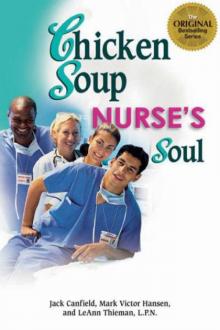 Chicken Soup for the Nurse's Soul: Second Dose
Chicken Soup for the Nurse's Soul: Second Dose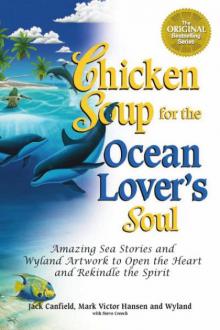 Chicken Soup for the Ocean Lover's Soul
Chicken Soup for the Ocean Lover's Soul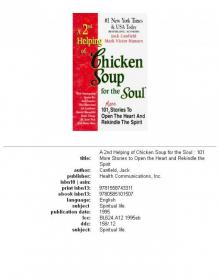 A 2nd Helping of Chicken Soup for the Soul
A 2nd Helping of Chicken Soup for the Soul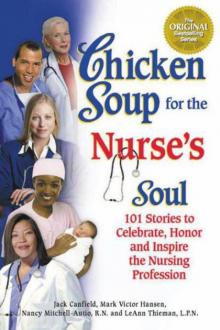 Chicken Soup for the Nurse's Soul
Chicken Soup for the Nurse's Soul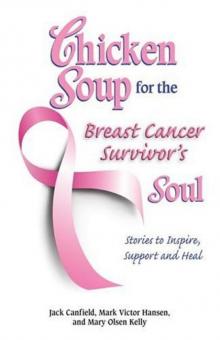 Chicken Soup for the Breast Cancer Survivor's Soul
Chicken Soup for the Breast Cancer Survivor's Soul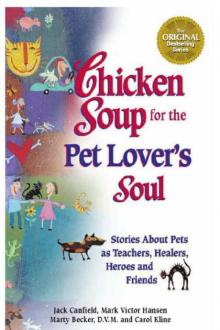 Chicken Soup for the Pet Lover's Soul
Chicken Soup for the Pet Lover's Soul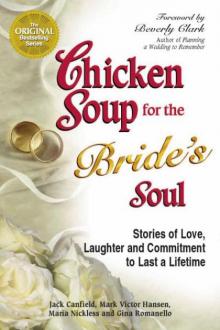 Chicken Soup for the Bride's Soul
Chicken Soup for the Bride's Soul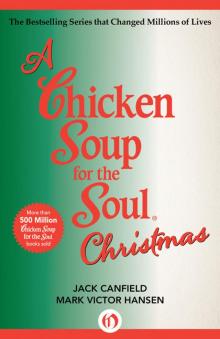 A Chicken Soup for the Soul Christmas
A Chicken Soup for the Soul Christmas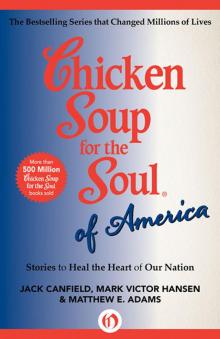 Chicken Soup for the Soul of America
Chicken Soup for the Soul of America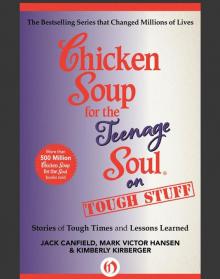 Chicken Soup for the Teenage Soul on Tough Stuff
Chicken Soup for the Teenage Soul on Tough Stuff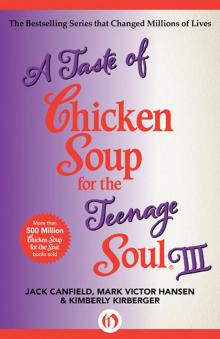 A Taste of Chicken Soup for the Teenage Soul III
A Taste of Chicken Soup for the Teenage Soul III Chicken Soup for Every Mom's Soul
Chicken Soup for Every Mom's Soul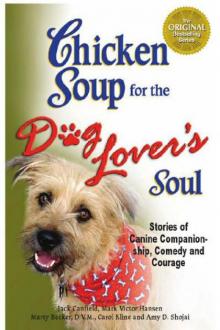 Chicken Soup for the Dog Lover's Soul
Chicken Soup for the Dog Lover's Soul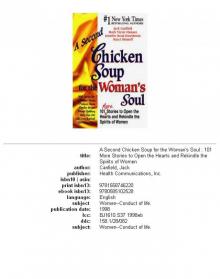 A Second Chicken Soup for the Woman's Soul
A Second Chicken Soup for the Woman's Soul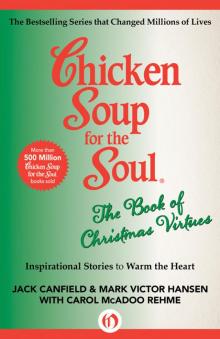 Chicken Soup for the Soul the Book of Christmas Virtues
Chicken Soup for the Soul the Book of Christmas Virtues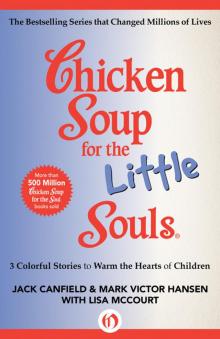 Chicken Soup for the Little Souls: 3 Colorful Stories to Warm the Hearts of Children
Chicken Soup for the Little Souls: 3 Colorful Stories to Warm the Hearts of Children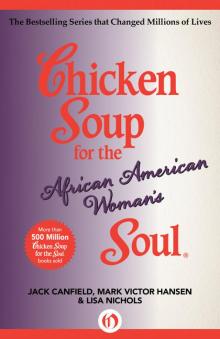 Chicken Soup for the African American Woman's Soul
Chicken Soup for the African American Woman's Soul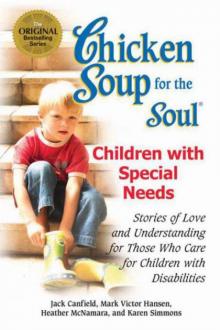 Chicken Soup for the Soul
Chicken Soup for the Soul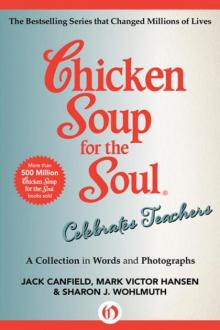 Chicken Soup for the Soul Celebrates Teachers
Chicken Soup for the Soul Celebrates Teachers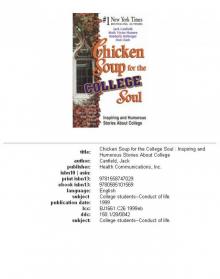 Chicken Soup for the College Soul
Chicken Soup for the College Soul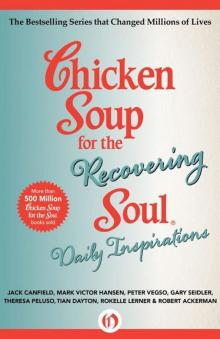 Chicken Soup for the Recovering Soul Daily Inspirations
Chicken Soup for the Recovering Soul Daily Inspirations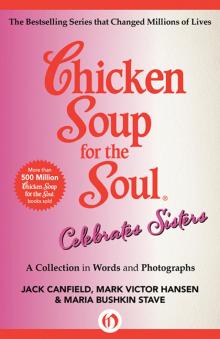 Chicken Soup for the Soul Celebrates Sisters
Chicken Soup for the Soul Celebrates Sisters Chicken Soup for the Dieter's Soul
Chicken Soup for the Dieter's Soul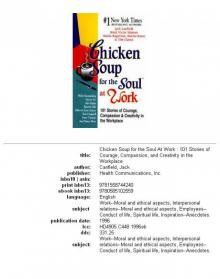 Chicken Soup for the Soul at Work 101 Stories of Courage
Chicken Soup for the Soul at Work 101 Stories of Courage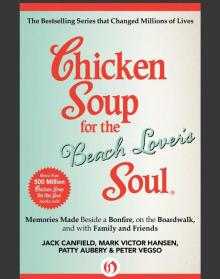 Chicken Soup for the Beach Lover's Soul
Chicken Soup for the Beach Lover's Soul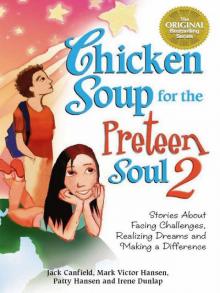 Stories About Facing Challenges, Realizing Dreams and Making a Difference
Stories About Facing Challenges, Realizing Dreams and Making a Difference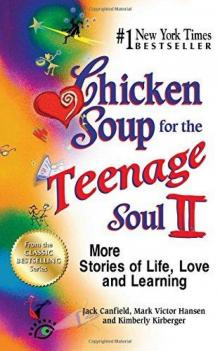 Chicken Soup for the Teenage Soul II
Chicken Soup for the Teenage Soul II Chicken Soup for the Girl's Soul
Chicken Soup for the Girl's Soul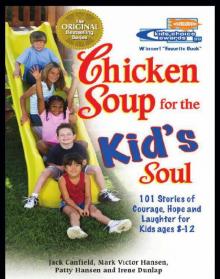 Chicken Soup for the Kid's Soul: 101 Stories of Courage, Hope and Laughter
Chicken Soup for the Kid's Soul: 101 Stories of Courage, Hope and Laughter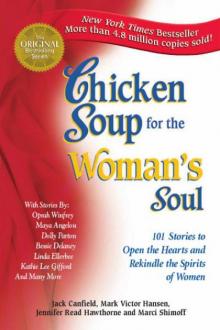 Chicken Soup for the Woman's Soul
Chicken Soup for the Woman's Soul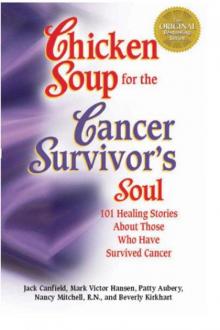 Chicken Soup for the Cancer Survivor's Soul
Chicken Soup for the Cancer Survivor's Soul Chicken Soup for the Canadian Soul
Chicken Soup for the Canadian Soul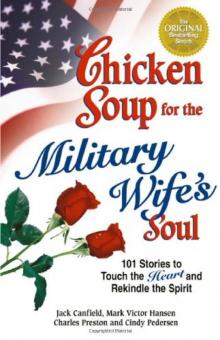 Chicken Soup for the Military Wife's Soul
Chicken Soup for the Military Wife's Soul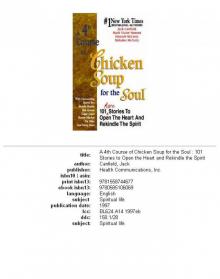 A 4th Course of Chicken Soup for the Soul
A 4th Course of Chicken Soup for the Soul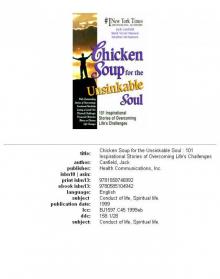 Chicken Soup Unsinkable Soul
Chicken Soup Unsinkable Soul Chicken Soup for the Soul: Christmas Magic
Chicken Soup for the Soul: Christmas Magic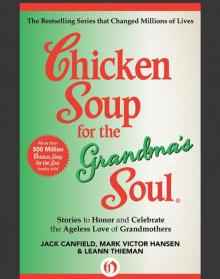 Chicken Soup for the Grandma's Soul
Chicken Soup for the Grandma's Soul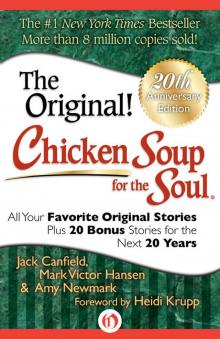 Chicken Soup for the Soul: All Your Favorite Original Stories
Chicken Soup for the Soul: All Your Favorite Original Stories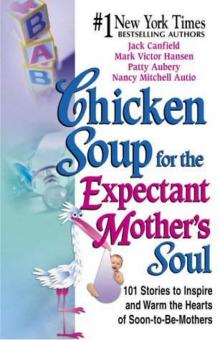 Chicken Soup for the Expectant Mother's Soul
Chicken Soup for the Expectant Mother's Soul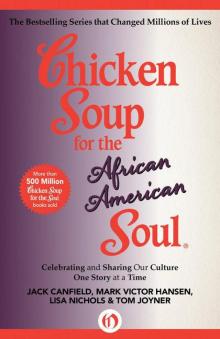 Chicken Soup for the African American Soul
Chicken Soup for the African American Soul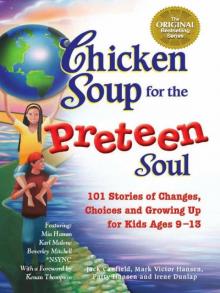 101 Stories of Changes, Choices and Growing Up for Kids Ages 9-13
101 Stories of Changes, Choices and Growing Up for Kids Ages 9-13 Christmas Magic
Christmas Magic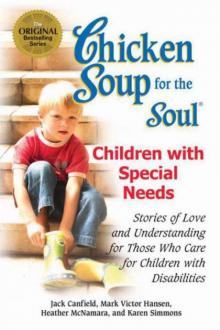 Chicken Soup for the Soul: Children with Special Needs
Chicken Soup for the Soul: Children with Special Needs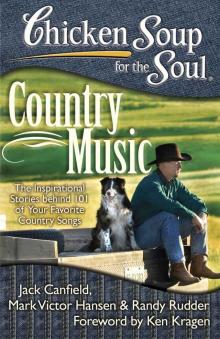 Chicken Soup for the Soul: Country Music: The Inspirational Stories behind 101 of Your Favorite Country Songs
Chicken Soup for the Soul: Country Music: The Inspirational Stories behind 101 of Your Favorite Country Songs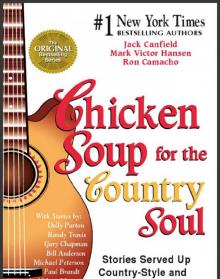 Chicken Soup for the Country Soul
Chicken Soup for the Country Soul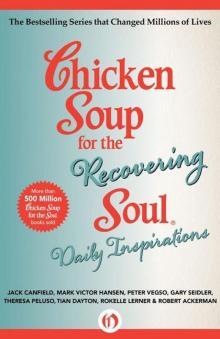 Chicken Soup for the Recovering Soul Daily Inspirations (Chicken Soup for the Soul)
Chicken Soup for the Recovering Soul Daily Inspirations (Chicken Soup for the Soul)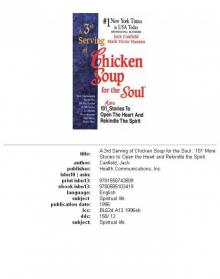 A 3rd Serving of Chicken Soup for the Soul
A 3rd Serving of Chicken Soup for the Soul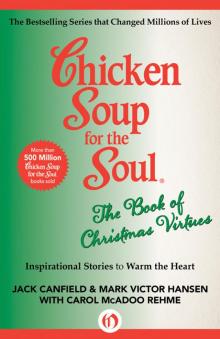 The Book of Christmas Virtues
The Book of Christmas Virtues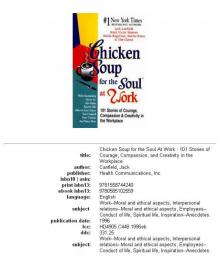 Chicken Soup for the Soul at Work
Chicken Soup for the Soul at Work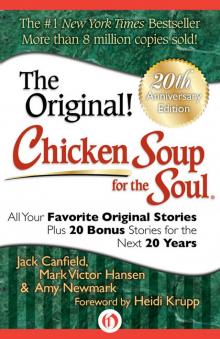 Chicken Soup for the Soul 20th Anniversary Edition
Chicken Soup for the Soul 20th Anniversary Edition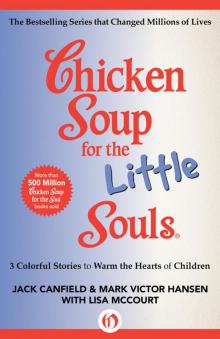 Chicken Soup for the Little Souls
Chicken Soup for the Little Souls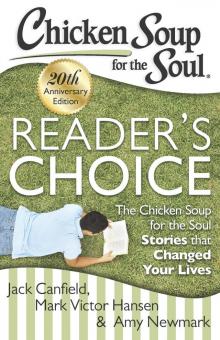 Chicken Soup for the Soul: Reader's Choice 20th Anniversary Edition
Chicken Soup for the Soul: Reader's Choice 20th Anniversary Edition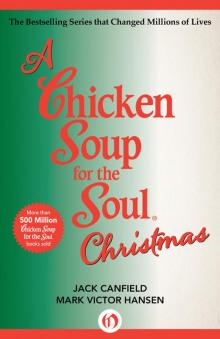 Chicken Soup for the Soul Christmas
Chicken Soup for the Soul Christmas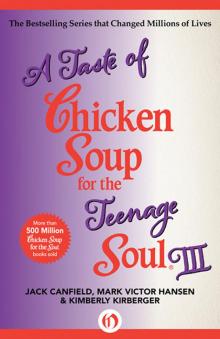 Taste of Chicken Soup for the Teenage Soul III
Taste of Chicken Soup for the Teenage Soul III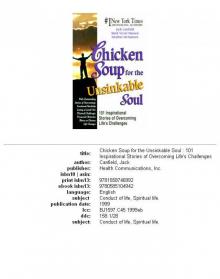 Chicken Soup for the Unsinkable Soul
Chicken Soup for the Unsinkable Soul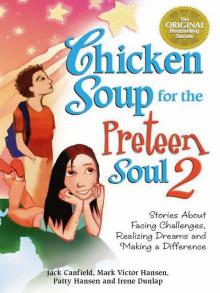 Chicken Soup for the Preteen Soul II
Chicken Soup for the Preteen Soul II